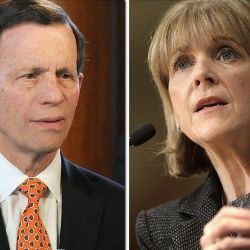Massachusetts Gubernatorial Candidates Divided On Online Gambling

Last week, Wellington Webb, National Co-Chair of the Coalition to Stop Internet Gambling, commended Massachusetts Attorney General Martha Coakley after she lent her support to the group’s ongoing battle to ban Internet gambling in the United States.
Coming out in opposition to online lottery sales in the northeastern state of Massachusetts, Gubernatorial candidate Martha Coakley expressed her strong concerns over the risks of gambling addiction, as well as underage verification methods employed by online sites, explaining:
“The potential to run up credit card debt gambling online will further weigh down many of those already struggling to keep their heads above water..I feel pretty strongly that it is not a good idea for consumers. It’s not a good idea for Massachusetts.”
Predictably, former Denver Mayor Wellington Webb was quick to applaud Martha Coakley’s stance, highlighting the fact that in the regulated online gambling market of New Jersey the average credit card debt per person is already running above $5,000 and that he believes the situation will only escalate over the coming years, ushering in a disastrous era for the American Middle Class. In addition, Wellington Webb was keen to point out that in New Jersey Internet gambling has so far delivered just 80% of initial projections, thus leaving The Garden State with a huge hole in its budget.
“What does that portend for other cash-starved states that are considering steps toward legalization?” exclaimed Webb.
Fortunately for Massachusetts, not all high level elected official agree with Martha Coakley’s position on the topic, with State Treasurer Steve Grossman, who is also expected to run for the office of state governor, coming out in favour of online gambling.
Online gambling opponents lack industry understanding
Coakley’s concerns that selling lottery tickets online will result in gambling addicts amassing huge debts echoes the well worn arguments extolled by those groups opposed to online gambling. However, it also demonstrates her lack of knowledge on the subject as to date no legitimate study has been conducted proving problem gambling rises through online gambling regulation or credit cards use.
Throughout the US, for instance, online gambling continues to be available with or without regulation through unlicensed offshore sites, while in the regulated market of New Jersey, many credit card companies continue to reject gambling transactions, especially those which take place online. Casing point, a recent IGLS panel discussion revealed that Visa has a 35% rejection rate, MasterCard a huge 50%, rising to 100% for American Express.
Furthermore, Coakley’s fears over age verification methods are unfounded considering they been employed by mainstream industries for many years, including banks and online alcohol and tobacco businesses. ID verification and payment processing company CAMS LLC, for example, currently provides ID and geo-location verifications in Nevada’s internet gaming market, with CEO Matthew Katz explaining that if a customer’s age verification cannot be determined with a high degree of confidence, then a Knowledge Based Authentication (KBA) method will subsequently be used to also ensure they are who they claim to be.
Consequently, any attempts to sidestep the system are likely to prove extremely difficult, with CEO Matthew Katz recently commenting on onlinepokerreport:
“Any player who wishes to beat the system has a life’s worth of public records to circumvent. The likely outcome is that their DOB fails to be verified and – as a result, they are not authorized to play. A similar thought process can be considered for false-negatives. We live in an information society where our dates of birth are everywhere.”
Grossman believes Lottery should get into online gambling business
On a more positive note, over the past few years State Treasurer Steve Grossman has been one of Massachusetts’ chief online gambling proponent, and recently sponsored bill S.101, that could potentially eliminate the barriers to selling online lottery tickets or accepting credit card payments. Grossman is Coakley’s chief Democratic rival for the gubernatorial race, with the current State Treasurer envisioning a completely different future for Massachusetts in which a regulated online gaming industry is run by the state using land based lottery retailers to sell its products.
Interestingly, Grossman’s bill is actually based on the December 2012 report he convened, which eventually concluded that online gambling products would inevitably be introduced to Massachusetts, and that “if the Lottery does not enter this online market, other entrants – including commercial casinos, tribal casinos, commercial gaming companies and other states – will.”
Back in 2011, Governor Deval Patrick signed the Massachusetts Casino Bill into law, allowing for the establishment of up to three casino resorts, with the first Massachusetts casino slated to open in early 2015. Many gambling operators therefore see the state permitting
internet gambling as the next natural step towards establishing a viable and competitive gambling industry.










